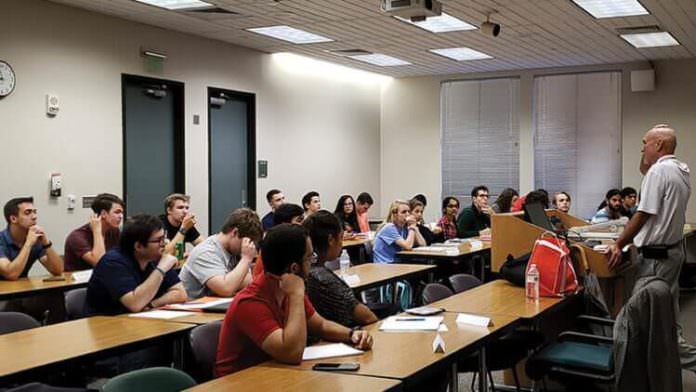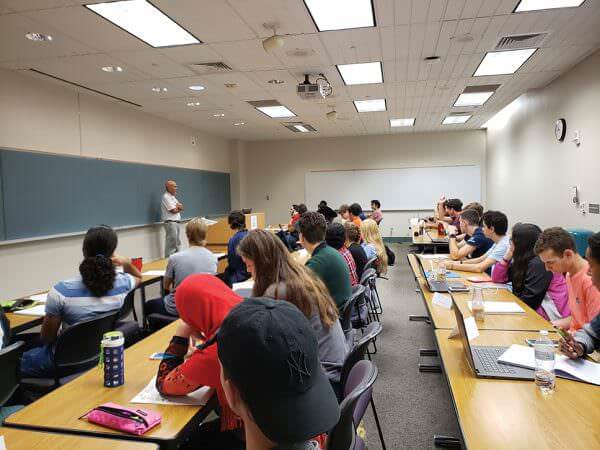
This fall finds me teaching Honors College freshmen in an introductory course under the rubric of Energy. Other sections address themes such as Sustainability, Media and even Happiness.
The Honors Tutorial I is a required course for all Honors College matriculates. Instructors work with aspiring scholars on how to read, write and engage in popular intellectual discourse. As such, the approach is, by definition, highly interdisciplinary in nature. Students identify and evaluate sources of information, and develop a base of knowledge essential for engaging in public policy conversations.
Given the acrimonious rhetoric now common in public policy debates, it’s worth dissecting where those exchanges sometimes go off the rails. In many cases, issues are oversimplified — a hammer sees everything as a nail. Alternatively, sometimes experts enter the fray with such a narrow focus that the bigger picture gets lost in the exquisite detail. All too often, the debate merely descends into personal attack.
Honors College freshmen have excelled over their academic careers at specialized study in discrete courses: math, physical sciences, biology, selected portions of world history and the like. Rarely, however, are they tasked with bringing the pieces together as public policy discussions require. Their challenge then is to cultivate confidence by linking the individual disciplines with which they have become familiar to create meaningful, coherent and credible narratives.
The facility to discuss public policy issues in a lucid manner benefits from a unifying context to encourage those linkages. The framework employed in my class is a concept called Big History, which David Christian, among other scholars, has developed as a way to paint a very large canvas in broad strokes. In barely 300 pages, Christian lays out an account of events not possible until very recently. Big History elucidates a timeline in rapid-fire succession, from the origin of the universe to present day. This high-level, yet comprehensive view across disciplines allows learners to plug their individual specialization of study into the larger picture.
For the theme of energy, I chose to take an expansive definition in order to give students latitude to pursue their own particular research interests. For example, all of the mega-innovations over the course of human history involve releasing new flows of energy — including some that we don’t often stop to consider. With the Agrarian Revolution, which began around 10,000 years ago, humans systematically extracted the energy from photosynthesis — essentially captured sunlight. This caused a big change in lifestyles. Prior to that, human ancestry spent roughly 2 million years wandering the earth as hunter-gatherers — by far the dominant era of human history in terms of duration.
Another, more recent mega-innovation involved harnessing fossil fuels such as coal, oil and natural gas, which constitute other forms of captured sunlight. The Industrial Revolution represents a recent and profound transformation of human civilization, activity and lifestyles — first with steam power, then later with more efficient internal combustion engines.
The ability to tap these new sources doubled human energy consumption during the 19th century. Then in the 20th century, energy consumption rose by a factor of 10 — much faster than the rate of increase in human populations.
Unleashing such enormous energy flows reverberates widely across regions and continents. According to Christian, diesel pumps remove freshwater from aquifers 10 times faster than natural flows are able to replenish them. We produce minerals, rocks and other forms of matter that have never existed before, such as plastics, pure aluminum, stainless steel and massive amounts of concrete. Intelligent and practical public policy should inform our capacity to harness vast quantities of energy and their associated products.
According to Christian, most modern educational systems don’t spend much time working with students to look at the future in a systematic fashion. Big History presents an opportunity for undergraduates to see the long arc of how we arrived at this precise moment in time and — as future policymakers — to articulate thoughtful scenarios about the path forward.
About the author: Thomas Tunstall, Ph.D., is the Senior Research Director at the University of Texas at San Antonio’s Institute for Economic Development, and was a principal investigator for numerous economic and community development studies. He has published peer-reviewed articles on shale oil and gas, and has written op-ed articles on the topic for the Wall Street Journal. Dr. Tunstall holds a doctorate degree in political economy, a master’s in business administration from The University of Texas at Dallas, and a bachelor of business administration from The University of Texas at Austin.
















